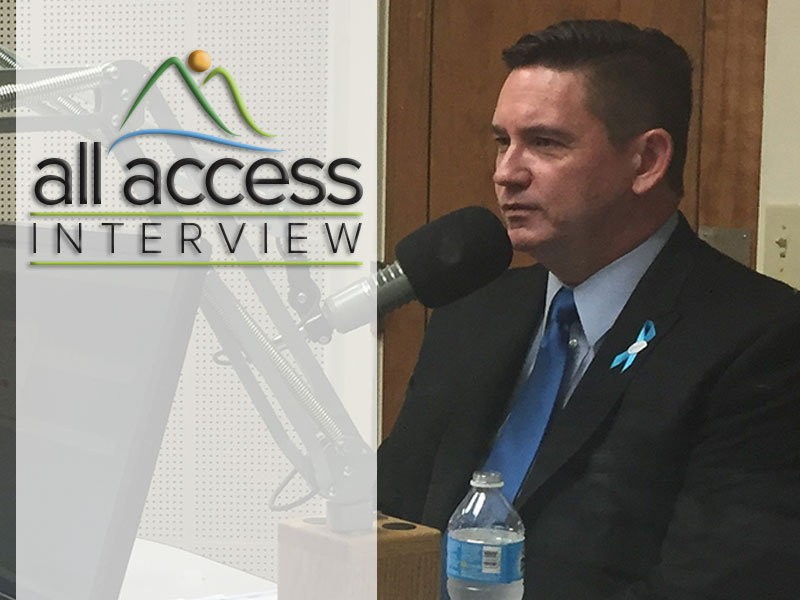In his second year as director of Georgia's child welfare agency, Bobby Cagle said the job has been difficult, but support from the legislature, Governor Nathan Deal and the people of Georgia has helped the organization.
"We have gotten over 600 positions as of July 1 of this year, and that has helped us do a much better job as an organization," Bobby Cagle said.
The Georgia Division of Family and Children Services Director was in Hall County this week, promoting the agency's Blueprint for Change, its strategy to implement recommendations from the Governor’s Child Welfare Reform Council.
THE PAST TWO YEARS
Cagle was appointed to lead the embattled agency in 2014, following the highly publicized death of two children.
In a June 2014 article, Atlanta Journal-Constitution reporter Bill Torpy referred to the DFCS Director position as the, "...state’s most impossible, no-win, politically dangerous job..."
Cagle has already defied the odds in one sense.
"My job is made easier when we have all of the resources we need, and that's been a key component of why it's not been as bad as the what the AJC predicted," Cagle said.
In a sit-down All-Access Interview this week, Cagle said the agency is working much better than it did when he started. He said there were about 4000 overdue investigations when he took over. That number has been whittled down to about 500.
"That's within the margin that we would expect with the very highly complex cases that we handle."
He expects DFCS performance to improve more as time goes on. Part of the process involves training new employees and something as simple as spending time on the job, or tenure in the field.
As Cagle strives to make improvements, the workload has increased since implementation of a child welfare intake call center. (1-855-GACHILD).
"Following that, we have seen an 80 percent increase in the number of reports of child maltreatment across the state."
Cagle said the underlying cause of the reports can be attributed to a variety of non-mutually exclusive issues. But over the last three years, he said approximately 29 percent were related to drug and alcohol abuse.
"I think we do have a very serious problem with drug abuse in the state, and it's showing up in our numbers as an agency."
GOVERNOR'S COUNCIL RECOMMENDATIONS
While the reform council's recommendations were more extensive, Cagle outlined two key areas, including staffing.
Caseload was a part of that. Cagle said the council and governor recommended no more than 15 cases per caseworker on average. He started his career as a child protection services worker and said 25 cases was about his limit.
"The first Saturday after I was appointed, I went out on the road with caseworker in Gwinnett County who had 83 cases. I can tell you, that's not just difficult, that's impossible."
Other council recommendations included additional training and resources to recruit foster parents, and the number two key, sharing of information among agencies.
"Prior to Senate Bill 138 being passed in the last session, we did not have a law that required agencies or even permitted agencies to share information that is confidential across agencies," Cagle said. "The shame of it would be if we had information that could protect a child contained in one file, and not being able to share that with another agency. That would be almost inexcusable."
BLUEPRINT FOR CHANGE SOLUTION
Director Cagle some state staff members are visiting regions of the state to discuss the blueprint, the reason behind his visit to Hall County.
It's a three-pillar system that starts with the practice model, or the agency's approach to how it interacts with families.
"Most of the cases that we deal with are neglect cases, and so what that requires is a very different more gentle approach by the agency to go in and understand the dynamics of a family," Cagle said.
The second pillar is robust workforce development. It involves recruiting the appropriate staff, training it well and retaining it. Cagle said the agency has had upwards of 36 percent turnover in front line positions.
"It is really dependent on building a level of skill over a period of years, to be able to do that work and do it well."
At present, the agency has added over 458 employees during Cagle's tenure. On July first, it can start hiring an additional 175.
The final pillar is constituent engagement, the reason behind Cagle's tour of the state. In Hall County, Cagle hosted a town hall meeting and another session with members of the faith community.
The engagement component also puts Cagle face-to-face with foster children, foster parents, law enforcement and court officials. He's also meeting with the agency's own staff across the state.
"I've talked to people who've worked for the department over 20 years and have never met the state's director, and for me, that's unacceptable."
Governor's council chairwoman Stephanie Blank was Cagle's guest on the visit in Hall County.

http://accesswdun.com/article/2016/5/399572/state-dfcs-leader-engages-public-on-blueprint-for-change
